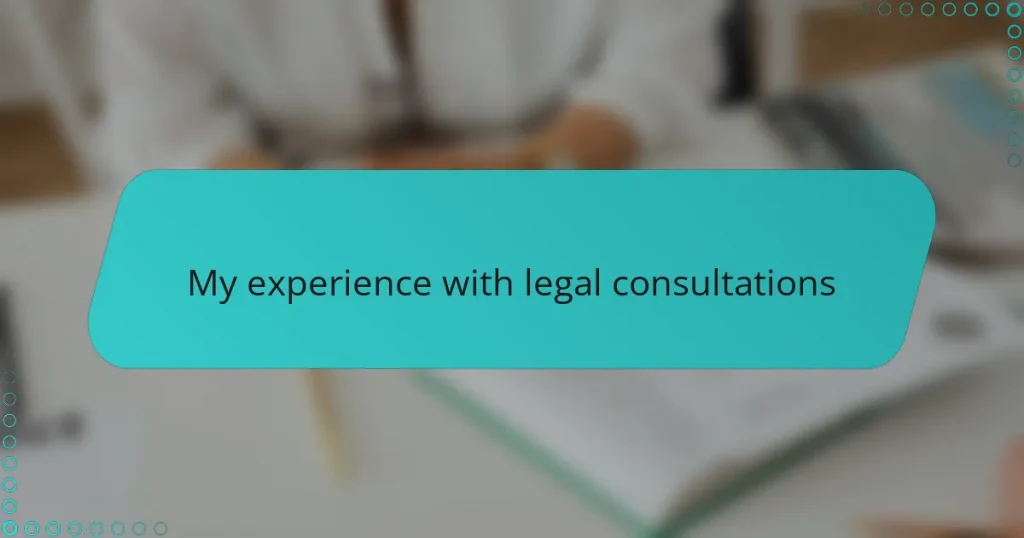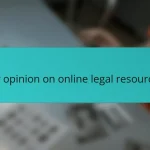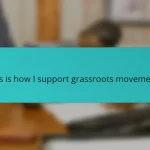Key takeaways
- Legal advocacy is about empowering individuals and ensuring their voices are heard, transforming the legal process into a more human experience.
- Preparing for a consultation by organizing questions and relevant documents enhances understanding and creates a more effective dialogue with the lawyer.
- During consultations, open communication and straightforward explanations help reduce anxiety and clarify legal options.
- Honesty in sharing details with your lawyer is crucial for receiving tailored advice, while requesting clear explanations can foster understanding of complex legal terms.
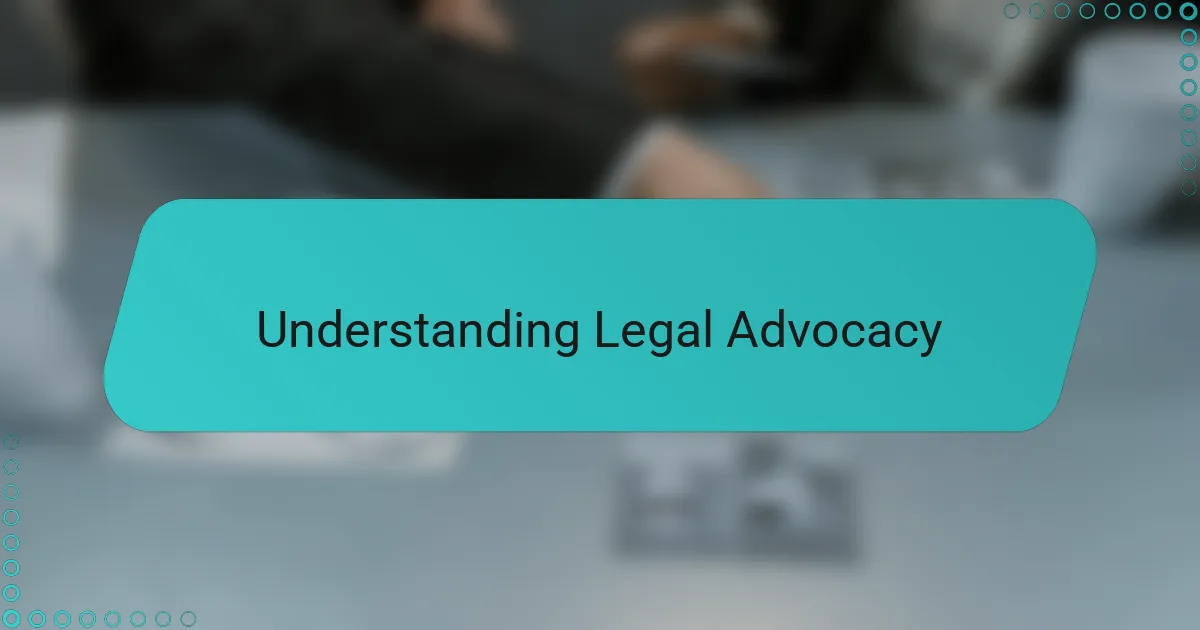
Understanding Legal Advocacy
Legal advocacy, in my experience, is more than just knowing the law—it’s about using that knowledge to support and empower others. I remember feeling overwhelmed at first, but realizing that advocacy means standing up for someone’s rights made all the difference. Have you ever thought about how important it is to have someone who truly understands your position on your side?
What strikes me most is how advocacy bridges the gap between legal jargon and real-life struggles. It’s not just about winning cases; it’s about ensuring people’s voices are heard and respected. This perspective changed how I viewed the whole legal process—making it feel more human and less intimidating.
Sometimes, I wonder if legal advocacy gets enough credit for that personal touch. It’s easy to forget that behind every file is a person needing guidance and reassurance. For me, understanding legal advocacy meant seeing laws as tools for justice, not just rules to follow.
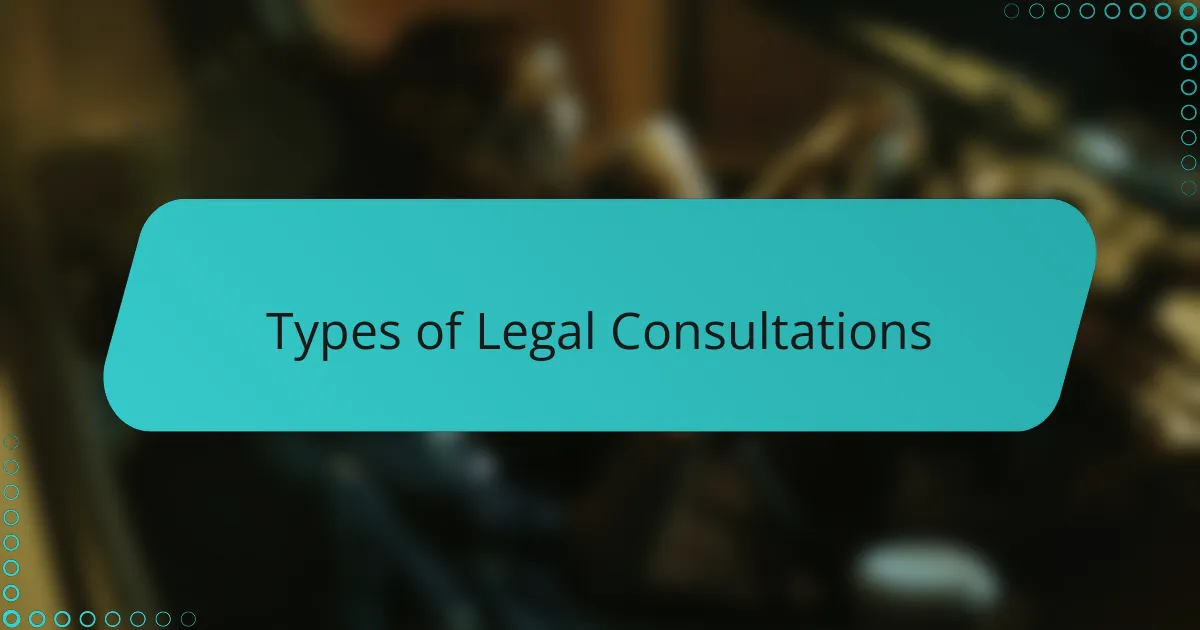
Types of Legal Consultations
Legal consultations come in many forms, each serving a specific purpose. From my experience, initial consultations often focus on understanding the basics of your situation and outlining possible legal paths. Have you ever walked into a meeting not knowing what to expect? That first discussion sets the tone and can either ease your worries or clarify tough decisions ahead.
Another type I encountered was document review consultations. Here, the lawyer goes through contracts or legal papers with you, explaining every detail. I found this incredibly helpful because legal language can feel like a foreign language—I needed someone to translate it into everyday words. It’s reassuring to have a professional break down the complexities so you can make informed choices.
Then there are ongoing consultations that happen throughout a case or negotiation. These aren’t just one-offs but continuous dialogues where strategy adjusts with new developments. I learned that staying in regular contact with your lawyer can mean the difference between feeling lost and feeling empowered. Have you ever wished you had that kind of steady support when facing a complicated issue?
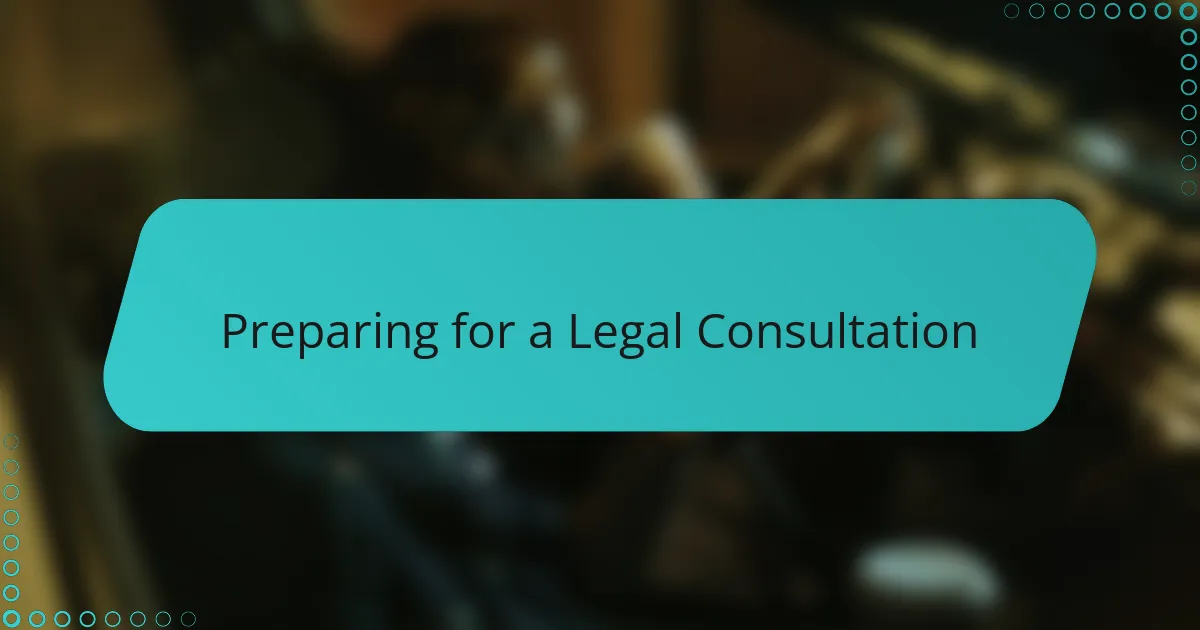
Preparing for a Legal Consultation
Before my first legal consultation, I made it a point to jot down all the questions swirling in my mind. I realized that having a clear list helped me stay focused and ensured I didn’t forget important details during the meeting. Have you ever walked out of a discussion wishing you’d asked something crucial? That prevented me from feeling that way.
Gathering relevant documents before the consultation was another step that made a huge difference. When I showed up with everything organized, the lawyer could quickly grasp my situation without wasting time searching for information. It felt like being prepared gave me a stronger footing, almost like stepping into the room with a little more confidence.
I also took a moment to reflect on what outcome I hoped for from the consultation. Knowing what I wanted helped me communicate more clearly and set realistic expectations. Have you ever been unsure of what you really wanted legally? Clarifying this beforehand can transform the consultation from a confusing chat into a productive conversation.
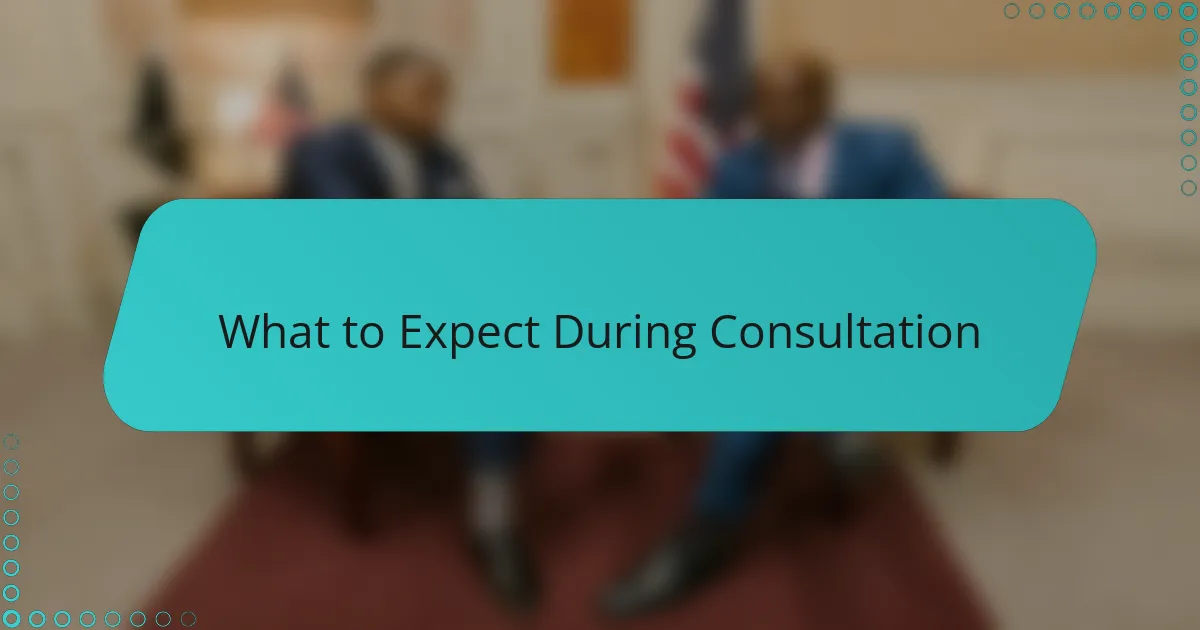
What to Expect During Consultation
When I sat down for my first consultation, I quickly realized it was less about legal lectures and more about a genuine conversation. The lawyer asked open-ended questions, inviting me to share my story, which immediately put me at ease. Have you noticed how being heard can turn nervousness into relief? For me, that moment was a game-changer.
Expect the lawyer to explain your options straightforwardly, breaking down complex terms into plain language. I remember feeling empowered when I finally understood the possible paths ahead. Isn’t it comforting when legal advice feels like practical guidance rather than confusing jargon?
The consultation usually ends with clear next steps, whether it’s gathering more evidence or setting another meeting. I’ve found that knowing what happens next, even if the process is long, creates a sense of control. Have you ever left a meeting unsure about what comes next? That uncertainty can add unnecessary stress, but a good consultation clears the fog.
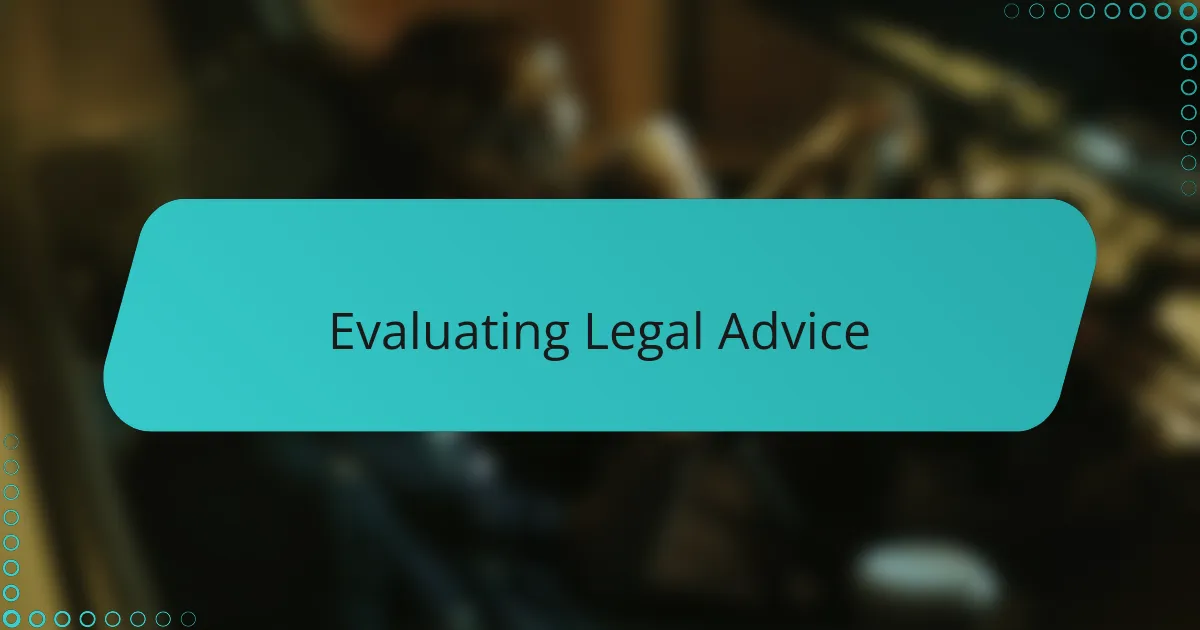
Evaluating Legal Advice
Evaluating legal advice, from my standpoint, goes beyond just hearing what the lawyer says—it’s about sensing whether their guidance resonates with your situation. Have you ever left a consultation wondering if the advice truly fits your needs? I found that asking myself this question helped me distinguish between generic information and tailored counsel.
One detail I pay close attention to is how transparent the lawyer is about risks and outcomes. When I felt the advice was honest, even if it wasn’t what I hoped to hear, it gave me a sense of trust. Isn’t it better to face the tough realities upfront than be blindsided later?
Lastly, I learned to trust my instincts about the lawyer’s communication style. If they seemed rushed or unclear, I hesitated to move forward. You know that feeling when something just doesn’t click? Listening to that inner voice made all the difference in getting advice that truly supported me.
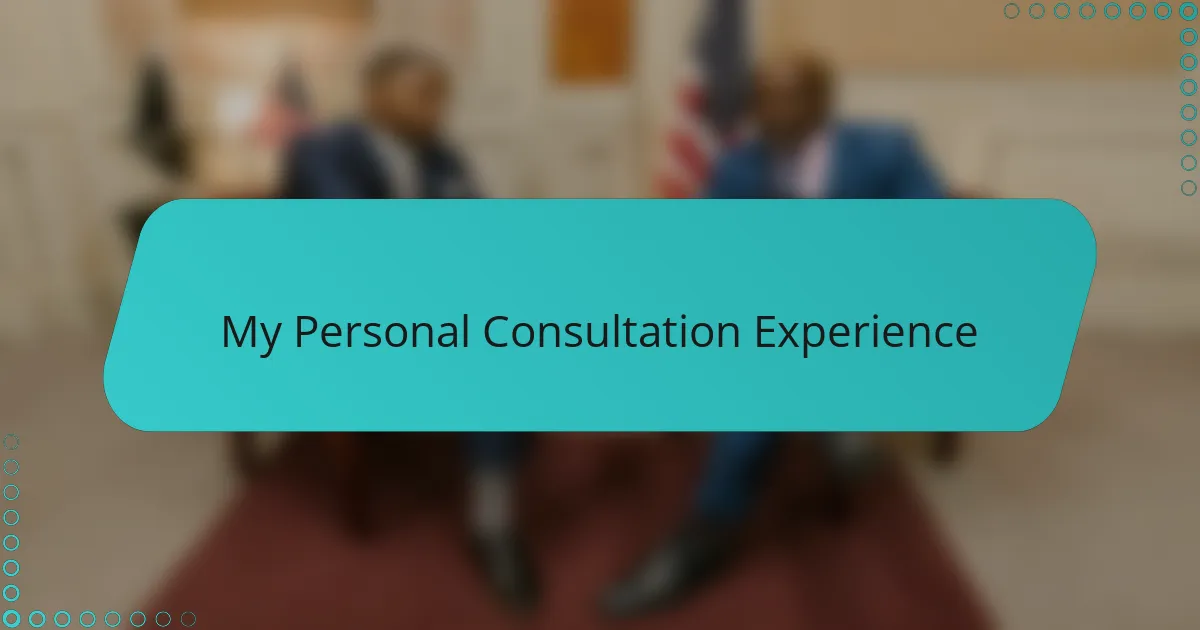
My Personal Consultation Experience
During my first legal consultation, I remember feeling a mix of anxiety and hope. Sitting across from the lawyer, I wasn’t sure if my concerns would be taken seriously, but as the conversation unfolded, that uncertainty slowly melted away. Have you ever experienced that shift from doubt to trust in a crucial moment? For me, it was the lawyer’s patience and genuine interest that made all the difference.
At one point, I asked about potential risks and was surprised by how openly my consultant shared the challenges ahead. It wasn’t easy to hear, yet that honesty gave me a sense of control rather than fear. Reflecting on that, I realize how rare it is to find advice that balances realism with empathy—it’s something I deeply appreciated.
Later consultations felt more like ongoing conversations than formal meetings. Staying connected and receiving updates helped me feel involved, not just a case number. Have you ever wished legal processes were less intimidating and more collaborative? My experience taught me that the right consultation can turn confusion into clarity, one chat at a time.
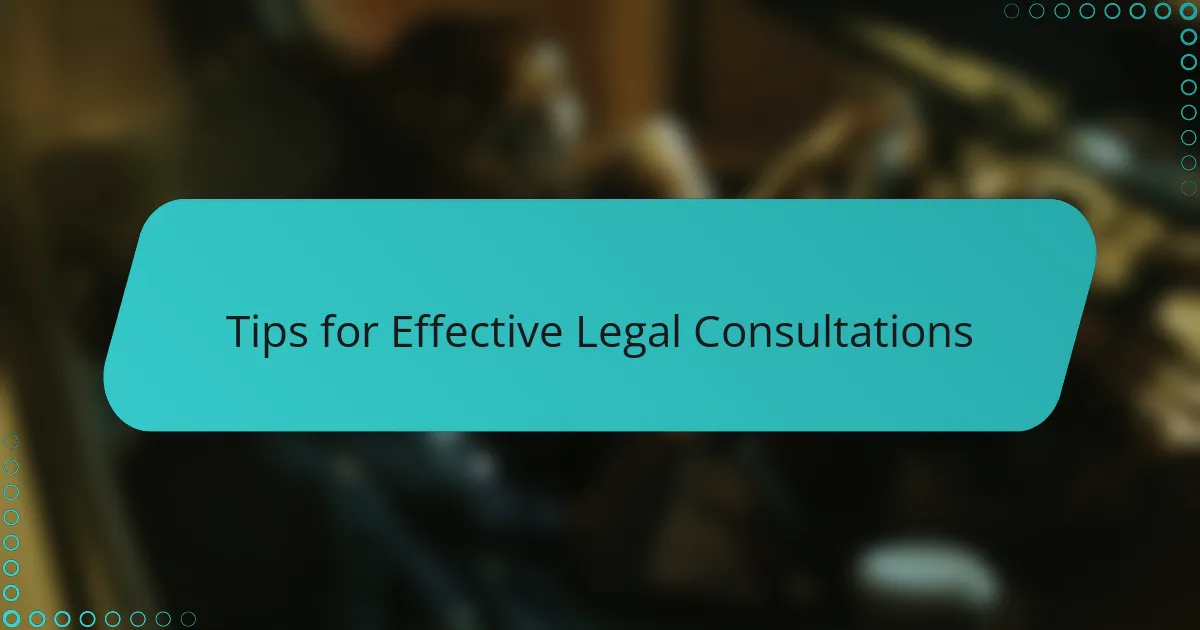
Tips for Effective Legal Consultations
One tip I found invaluable is coming to the consultation with a clear agenda. When I jotted down my questions ahead of time, it helped me stay focused and made sure nothing important slipped through the cracks. Have you ever felt overwhelmed by so much to say but unsure where to start? Organizing your thoughts can turn that chaos into clarity.
Another thing I learned is to be honest and open during the conversation. At first, I hesitated to share details I thought might be embarrassing or irrelevant, but I realized the lawyer needed the full picture to offer the best guidance. Isn’t it liberating when you finally voice your concerns and feel understood?
Finally, don’t hesitate to ask for explanations in plain language. Legal terms can be confusing, and I often found myself nodding without really grasping the meaning. When I asked my lawyer to break things down, the whole process became less intimidating. Have you experienced that “aha” moment when complex ideas suddenly click? It makes all the difference.
